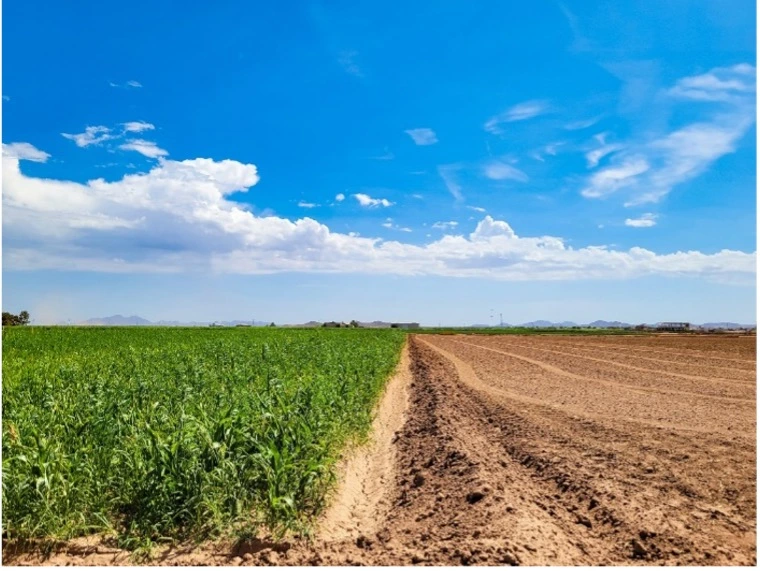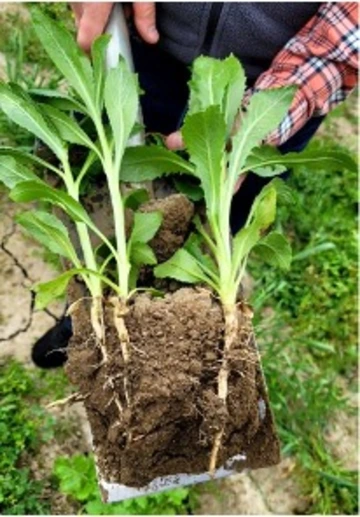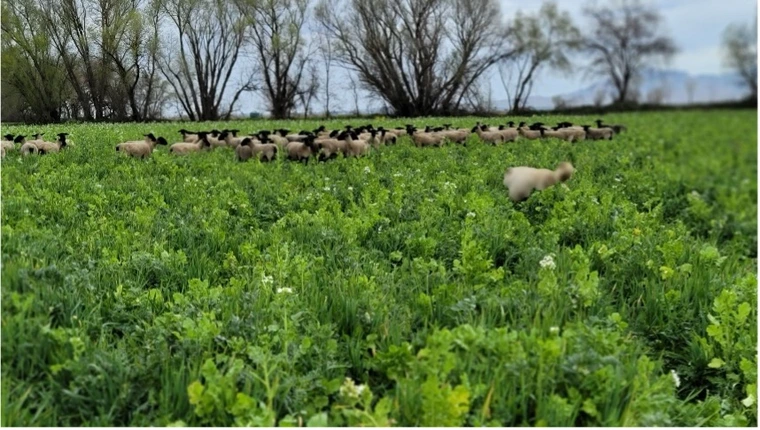The nature of agriculture has always been evolving with the needs of the people. As a result of the public’s concern over climate change, conservation strategies like cover cropping have been investigated to note any ecosystem services they may provide, allowing those in the industry to tally their many benefits. On a regional scale, cover crops may improve soil health and quality, additionally contributing to soil conservation; globally, cover crops may aid carbon sequestration and reduce greenhouse gas emissions. The importance of arid agriculture in this context cannot be overlooked. Many researchers, policymakers, and agricultural stakeholders in the US Desert Southwest have begun to realize that though cover crops may not be suitable for green manuring in the region due to strict water budgets, they may, however, be suitable for use as alternative forage crops to fetch additional economic gains while acting as physical barriers to prevent soil erosion and support beneficial ecosystem services ultimately improving soil health in desert agroecosystems.
Carbon sequestration is a term used to describe actions associated with the reduction in carbon dioxide (CO2) emissions to capture carbon and ensure its environmentally secure and stable storage (USGS, n.d.). In recent decades, there has been growing interest in climate-smart agriculture, an integrated approach allowing farmers and landowners to aid in the removal of greenhouse gases while increasing agricultural productivity (USDA, 2023a). This approach can play essential roles in carbon sequestration, and by extension, global climate change mitigation strategies. The total global soil carbon pool contains about 2500 petagrams (Pg; 1 petagram = 1 gigatonne = about 2.2 trillion pounds). For comparison, the soil carbon pool is about 3.3 times larger than the atmospheric carbon pool (Lal, 2004). It is in part because the earth’s soils can hold carbon so effectively that many contemporary carbon sequestration strategies involve agriculture and soil carbon. For example, when used to cover fallow soils, cover crops may provide the following benefits to soil health and quality (NRCS, 2014), (Figure 1):
- Reduce rates of erosion from wind and precipitation by creating a physical barrier over the soil that reduces the impact of raindrops and erosion by wind. Maintain or increase soil health and organic matter content.
- Reduce degradation of water quality through utilizing excessive nutrients.
- Suppress weed pressures and break pest cycles. ▪ Improve soil moisture use efficiency.
- Minimize soil compaction. When looking into how some of these positive effects come to be, a common link can be found: increasing soil organic matter content in the soil system.
Soil organic matter (SOM) is the fraction of the soil comprising plant and animal tissues at various states of decomposition (Lehmann & Kleber, 2015). With additional organic matter content, more carbon will be present in the soil, ensuring that less may be released into the atmosphere. Though growers in desert regions may be especially impactful as desert soils often lack excess SOM, it has been suggested that rates of carbon sequestration may be lower until sufficient SOM concentrations are reached. The stable storage of carbon may be an interplay between soil microbiota and carbon within the soil, indicating that increasing the SOM may also increase rates of carbon sequestration (Bhattacharyya et al., 2022). With consideration to these factors, growers are able to make a positive environmental impact by increasing the rates of carbon sequestration in their soils while reaping the benefits of increasing the organic matter content.

Figure 1. Cover crops (left) used to cover fallow soils (right) at the Maricopa Agricultural Center in Maricopa, AZ.
Carbon sequestration
Carbon in soils
Carbon sequestration, as previously described, is the removal and subsequent stable storage of carbon from the atmosphere. Soil carbon can take the form of either soil organic carbon (SOC) or soil inorganic carbon (SIC). While sequestering carbon in either form can be beneficial for the planet as a whole, it is the sequestration of SOC that is most desirable for growers. Sequestering organic carbon increases organic matter content in soils, while sequestering inorganic carbon may result in an increase in calcium carbonate, often forming caliche, which can hinder root activities and make crop production difficult (Chaudhury et al., 2016). Thankfully, cover crops do well in increasing SOC, thus leading to healthier, and potentially more fertile, soils. Though some of the carbon sequestered can be perceived at a microscopic level, this also includes plant tissues and root systems that can be seen by the naked eye (Figure 2).

Figure 2. A surface soil cross-section shows some of the organic matter added to the soil system via cover crops.
More carbon in
To ensure carbon sequestration is taking place in soils, there needs to be an imbalance between carbon inputs and carbon outputs, specifically ensuring more carbon is entering the soils than leaving. Cover crops increase carbon inputs both directly and indirectly. Direct soil carbon sequestration can occur as plants pull CO2 from the atmosphere to use during photosynthesis, and atmospheric carbon is incorporated into cover crop biomass, which in turn can transform into SOM. Indirect soil carbon sequestration occurs when the plant materials go through microbial decomposition in the soil, leaving the carbon in their tissues behind as soil organic carbon (SOC) and carbon stored as microbial biomass (De Stefano & Jacobson, 2018). These processes are not exclusive to cover crops, as perennial vegetation tends to have more days of active growth per year while annual vegetation is subject to dying off and decomposing, causing more carbon to be released (USDA, 2021). Under the production of rotating annual crops, however, implementing cover crops is an effective strategy for creating a net increase in carbon sequestered into the soil, while also working to improve soil health. Other practices to minimize soil disturbance (reduced tillage) can also contribute towards SOC enrichment in the soil through the reduction of CO2 emission from disruption of aggregates and aeration of carbon-rich soil particles.
Plant biomass in and above soils increases as cover crops are used to replace fallow fields, creating further opportunities for photosynthesis and decomposition. In addition, cover crops can increase opportunities for green manuring after termination or foraging, as livestock can graze on the cover crops and passively manure the fields (Figure 3). However, these practices may not be applicable to every agricultural production scenario. For example, green-manuring may not always be feasible for growers in arid regions like the Desert Southwest due to extreme irrigation water scarcity, but cover crops can be used as alternative forage like weeping lovegrass and kleingrass (Putnam & Kallenbach, 1997) to replace high water-use traditional forage crops like sudangrass or corn (Sanyal et al., 2023). Thus, cover cropping can be an effective strategy to fulfill multiple functions depending on the needs of the grower as well as existing environmental conditions.

Figure 3. Additional opportunities for providing supplemental livestock feed can be created through the planting of cover crops.
Less carbon out
Cover crops sequester carbon not only by increasing the amount of carbon in the soil but also by working to reduce the outflux of carbon from the soil to the atmosphere. This is in part due to the increased aggregation of soil particles (Chaplot & Cooper, 2015), which works in a few different ways. SOM that is free in the soil can be more readily available to be used by the soil microbiome (the communities of microorganisms that live within the soil) to fulfill their energy needs. The more readily available SOM is, the more readily the associated carbon can be removed from the soil system through the activities of the microbiome; this process can cause carbon to be released as a gas into the soil system, then to the atmosphere. SOM inside soil aggregates is protected from soil microbiota, ensuring that the stored carbon is more secure. These aggregates are formed due to the binding of organic molecules to clay particles. Aggregation can be performed not only chemically, but may be assisted by the binding of roots, fungal or mycorrhizal hyphae, or by other microbial agents (Goss & Kay, 2005), (Figure 4). Through these interactions between the organic and mineral soil components, it can be seen that increased SOM can lead to increased aggregate stability. Some specific microorganisms in the soil can also consume the carbon and other nutrients made available by the cover crops and contribute to the building of more stable soil aggregates, perpetuating even further aggregation in soils. Additionally, cover crops can act as physical barriers, often referred to as ‘soil armor’ that prevent weathering; this function is manifested by having the crops themselves absorb the force of falling raindrops or force from the wind. With less force applied by rain and wind, less soil erosion will take place, ensuring that the contents of the soil (like the soil carbon) don’t exit the soil.
Soil aggregation is essential when maintaining the soil carbon pool. Stable aggregates are more resistant to breakdown, meaning that a soil with more stable aggregates will experience less erosion. As aggregation is correlated with SOC, SOC has been recognized as not only an important indicator of soil health but maintaining SOC concentrations has in fact been recognized by the United Nations Convention to Combat Desertification (UNCCD) and the United Nations Framework Convention on Climate Change (UNFCCC) to be key in preventing land degradation (Winowiecki et al., 2016). This is because of some estimates which suggest that a substantial amount of carbon (42-78 Pg carbon) is lost from the world’s soils due to SOM degradation (Gougoulias et al., 2014); building back earth’s organic matter is therefore a priority.

